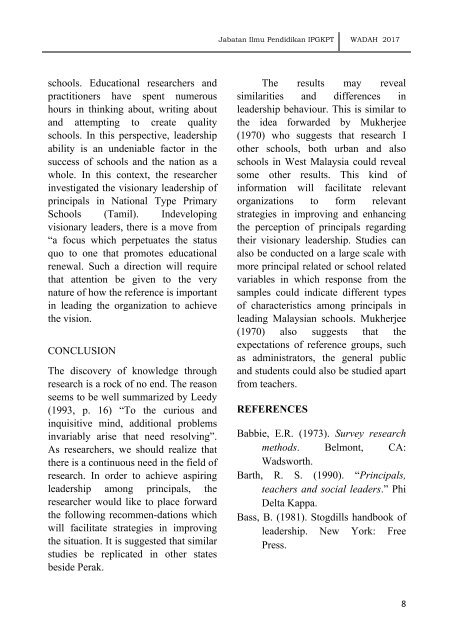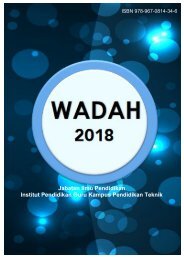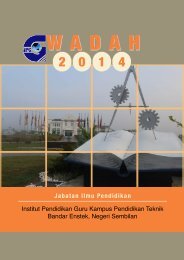WADAH 2017_FINAL
You also want an ePaper? Increase the reach of your titles
YUMPU automatically turns print PDFs into web optimized ePapers that Google loves.
Jabatan Ilmu Pendidikan IPGKPT <strong>WADAH</strong> <strong>2017</strong><br />
schools. Educational researchers and<br />
practitioners have spent numerous<br />
hours in thinking about, writing about<br />
and attempting to create quality<br />
schools. In this perspective, leadership<br />
ability is an undeniable factor in the<br />
success of schools and the nation as a<br />
whole. In this context, the researcher<br />
investigated the visionary leadership of<br />
principals in National Type Primary<br />
Schools (Tamil). Indeveloping<br />
visionary leaders, there is a move from<br />
“a focus which perpetuates the status<br />
quo to one that promotes educational<br />
renewal. Such a direction will require<br />
that attention be given to the very<br />
nature of how the reference is important<br />
in leading the organization to achieve<br />
the vision.<br />
CONCLUSION<br />
The discovery of knowledge through<br />
research is a rock of no end. The reason<br />
seems to be well summarized by Leedy<br />
(1993, p. 16) “To the curious and<br />
inquisitive mind, additional problems<br />
invariably arise that need resolving”.<br />
As researchers, we should realize that<br />
there is a continuous need in the field of<br />
research. In order to achieve aspiring<br />
leadership among principals, the<br />
researcher would like to place forward<br />
the following recommen-dations which<br />
will facilitate strategies in improving<br />
the situation. It is suggested that similar<br />
studies be replicated in other states<br />
beside Perak.<br />
The results may reveal<br />
similarities and differences in<br />
leadership behaviour. This is similar to<br />
the idea forwarded by Mukherjee<br />
(1970) who suggests that research I<br />
other schools, both urban and also<br />
schools in West Malaysia could reveal<br />
some other results. This kind of<br />
information will facilitate relevant<br />
organizations to form relevant<br />
strategies in improving and enhancing<br />
the perception of principals regarding<br />
their visionary leadership. Studies can<br />
also be conducted on a large scale with<br />
more principal related or school related<br />
variables in which response from the<br />
samples could indicate different types<br />
of characteristics among principals in<br />
leading Malaysian schools. Mukherjee<br />
(1970) also suggests that the<br />
expectations of reference groups, such<br />
as administrators, the general public<br />
and students could also be studied apart<br />
from teachers.<br />
REFERENCES<br />
Babbie, E.R. (1973). Survey research<br />
methods. Belmont, CA:<br />
Wadsworth.<br />
Barth, R. S. (1990). “Principals,<br />
teachers and social leaders.” Phi<br />
Delta Kappa.<br />
Bass, B. (1981). Stogdills handbook of<br />
leadership. New York: Free<br />
Press.<br />
8





